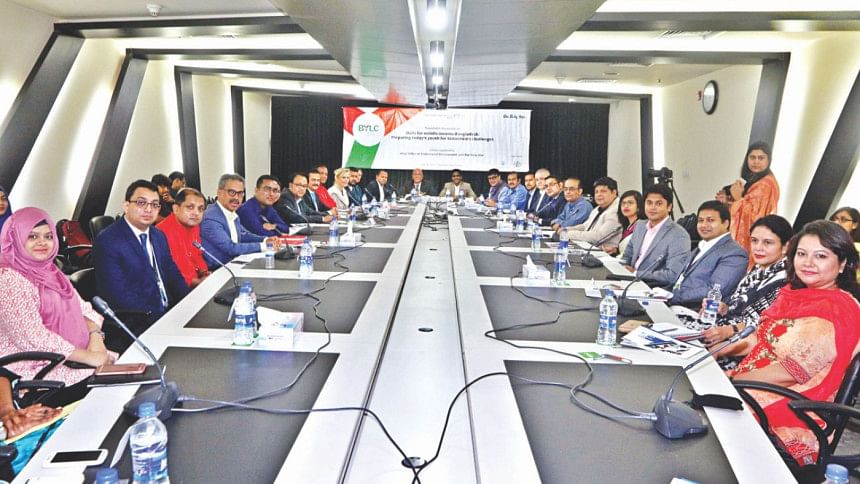Youths need to be properly equipped

Bangladesh's large youth population has to be equipped with right set of skills to make them employable in the fast-changing job market, experts said yesterday.
Preparing the youth is crucial for the economy as some jobs are disappearing while new opportunities are opening up, they observed.
“The reality is Bangladesh has very serious unemployment and under-employment. There is not enough economic diversity in the country. The current sectors are not good enough to provide the number of jobs that you need,” said Sudipto Mukerjee, UNDP country director in Bangladesh.
He said all the indicators showed that the entire economic growth had been jobless in the subcontinent, including India and Bangladesh.
“You've serious issues of violent extremism, which is on the rise. We can't afford it,” said Sudipto, adding that all these years of wonderful development would be put at risk if these issues were not addressed.
“Bangladesh needs to diversify quickly and promote the culture of innovation. If you don't innovate, you become irrelevant soon.”
He made the comments at a roundtable titled “Skills for middle-income Bangladesh: Preparing today's youth for tomorrow's challenges” at The Daily Star Centre in the capital.
Bangladesh Youth Leadership Centre (BYLC) organised the discussion in association with The Daily Star, Aga Khan Foundation (Bangladesh) and Rizwan Adatia Foundation. Akter Matin Chaudhury, chairperson of the Dhaka-based leadership development institute, moderated the programme.
More than 50 percent of the population is young in Bangladesh against 20 to 25 percent in Europe, said Mahtab Uddin Ahmed, managing director of Robi, the second-largest mobile carrier in Bangladesh.
“The future driver of the opportunities is the young population that we have. So, all of us will have to take our share of responsibility to give them the right direction.”
He suggested the universities teach data science and digital media as their demand is increasing globally. He also called for digitally educating people with the help of top class teachers and increasing internet accessibility.
Abrar A Anwar, chief executive officer of Standard Chartered Bangladesh, said a middle income Bangladesh would mean 2.5 times its current GDP or $650 billion, with 90 percent of it coming from service and industry sectors.
To serve the bigger economy, skill development is of critical importance for emerging youth joining the job market, he said.
“We have fantastic talent in our country -- raw talent. But we have to nurture them. Development of people is key to our success.”
Michael Foley, CEO of Grameenphone, the leading mobile carrier in Bangladesh, called for increasing the number of women in workforce, saying they were needed because diversity leads to better decisions.
“Diversity creates more productive businesses. Shareholders' return in women-led businesses is higher than in men-led business,” he said.
Md Sabur Khan, chairman of Daffodil University, said giving focus only on the tertiary-level education would not be fruitful because the mindset of students grew at an early stage.
“Schools and colleges focus on the CGPA. They concentrate on what grades students are getting instead of skill development or career mapping,” he said, adding students blamed universities if they failed to secure jobs.
Faruque Hassan, senior vice president of Bangladesh Garment Manufacturers and Exporters Association, said the garment sector was facing shortage of skilled manpower.
He said labour-intensive manufacturing industries would undoubtedly play a vital role for developing the country in the next few years. “But do we have the right kind of skills to capitalise on our potential? We don't, despite having a young and vibrant population.”
According to him, two million new faces are joining the workforce every year. But there is a huge gap between the skills produced by educational institutions and the demand of industries.
“There is shortage of fashion designers, technicians, dyeing specialists, washing and finishing experts and industrial technologists. These positions are so far being filled up by foreign experts.”
The skill gap in mid-level management positions is also significant in terms of communications and managerial skills, Faruque told the meeting.
Youth and Sports Secretary Md Ashadul Islam said mismatch between demand and supply of skilled workers was a global problem.
The government has taken various initiatives and drawn up policies to develop the skills of youths, he added.
Rubana Huq, managing director of Mohammadi Group, said the job market was shrinking as capital-intensive industries were taking the place of the labour-intensive industries, creating youth unemployment.
She said the economy would have to become inward-looking in the face of shrinking exports. “So, we need to do a lot of work in the area of research and development.”
Tanvir Haider Chaudhury, CEO of Kazi Food Industries Ltd, said the young generation was passionate and would want to connect with something that emotionally resonates with it.
Farzana Chowdhury, CEO of Green Delta Insurance Company Ltd, said her company always faced skill shortage as people didn't want to join the industry.
They don't see it as an attractive sector for a lack of knowledge of it, she added.
The curriculums of educational institutions should be modified in order to bridge the gap between the institutions and the practitioners, she observed.
She also stressed the need for investing in women, who make up half of the country's population.
Leoni Cuelenaere, ambassador of the Netherlands to Bangladesh, said leadership skills needed to change because one couldn't continue working in an old-fashioned way.
She said diversity at workplaces was important, by way of hiring people with different cultural backgrounds and people from all walks of life.
“So, you will have to train your people in a different way.”
Pial Islam, managing partner of Dhaka-based pi Strategy Ltd, said there would be major changes in the nature of jobs in the next 20-30 years.
He recommended bringing changes to the education system in the light of the prospective changes in the future job industry.
He also underscored the need for practising ethics and collaborative efforts to ensure productive outputs.
Mahfuz Anam, editor and publisher of The Daily Star, said Bangladesh could gain from demographic dividend as the population was young.
“But unless this young population is employed, they are likely to become disillusioned, which then leads to all sorts of anti-social activities,” he added.
Nabeel Ud Daulah, managing director of DIRD Group, said education should provide knowledge and training to people on some basic skill sets before they joined an organisation.
Asif Zahir, managing director of Zero Gravity Ventures Ltd, said many young people entering job market looked for an organisation with a purpose. “They want to make a difference in the society.”
Ejaj Ahmad, president of BYLC, said there was a lack of critical thinking and problem-solving in the academic curriculums.
“As a result, young generation come to the job market with inadequate critical thinking and problem-solving skills,” he noted.

 For all latest news, follow The Daily Star's Google News channel.
For all latest news, follow The Daily Star's Google News channel. 








Comments